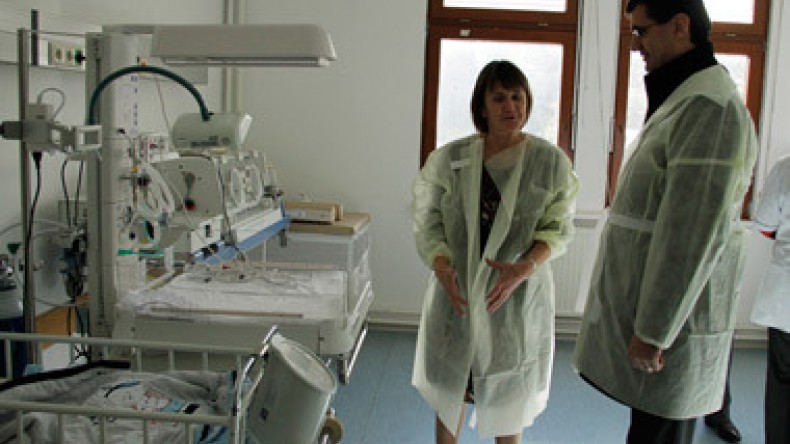
Stepanavan hospital neonatal department receives equipment as part of VivaCell-MTS neonatal care project
VivaCell-MTS announces that VivaCell-MTS General Manager Ralph Yirikian and BirthLink NGO Director Kathy Mellor, as well as a group of neonatologists, visited the neonatal department of the Stepanavan hospital, Lori region.
Stepanavan hospital neonatal department received the following neonatal care equipment in frames of the project in Lori region: an infant radiant warmer – intensive care cot, phototherapy unit for treating jaundice, pulse oximeter for monitoring oxygenation, heated mattress, portable oxygen cylinder with low flow meter, emergency bag for transporting sick babies, suction apparatus.
This essential equipment is necessary for maintaining the baby’s temperature and stabilizing or sustaining the baby until transfer can be undertaken to a regional centre or to Yerevan. Some babies with potentially life-threatening problems, who receive immediate and appropriate care after delivery, may need no further intervention. This equipment can be the difference between life and death.
“We are happy that the Neonatal care project has reached Lori region as well. This project is aimed at improving access to medical services in the regions. People in the regions should have equal opportunities to receive medical services, especially when it comes to infants,” VivaCell-MTS General Manager Ralph Yirikian commented. “Each child’s life is a gift, and as a caring
company VivaCell-MTS is committed to helping maternity hospitals in eradicating the biggest challenge that we have today – the infant mortality rate.”
For the 5th year in a row VivaCell-MTS together with BirthLink NGO makes efforts aimed at reducing the level of infant mortality in our country. Within this period of time, the equipment for a total of about AMD 360 million has been installed in more than 30 medical centers of Yerevan and the regions. The specialists say the positive results are already obvious.
Every year, more than 4 million infants worldwide die in the first year of life. 98 percent of the cases are registered in the developing countries. 65 percent of lethal cases are registered within the first month, with two third of them – during the first week, and more than half – within the first 24 hours after the birth.
Newsfeed
Videos






























